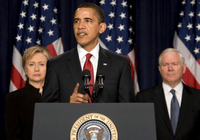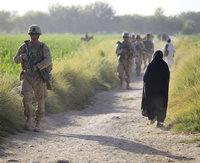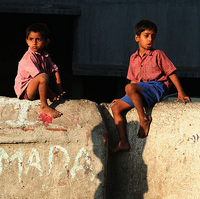With the exception of a few details, it’s safe to say that the London conference on Afghanistan hit all the right notes, by which I mean the politically necessary ones. Afghanization will continue apace, regardless of the Afghans’ actual capacity to shoulder it, and negotiating with the Taliban has gotten the formal seal of approval, regardless of the Taliban’s actual willingness to negotiate. NATO can announce member states’ increased troop commitments, regardless of member states’ intentions of following through, while Western governments can simultaneous announce troop drawdowns over the course of 2011, regardless of whether the security situation permits them. […]
South Asia Archive
Free Newsletter
Has Washington removed the restraints on India’s response to future terror attacks originating from Pakistan? That’s what Ajai Shukla suggests in parsing a statement made by Defense Secretary Robert Gates during his recent visit to India. More significantly, says Shukla, Gates repeated the formula almost word for word days later in Pakistan, instead of walking it back for the Pakistani viewing audience. Was Washington merely waving the India stick to nudge Islamabad towardgreater cooperation in the Af-Pak war? Or, is the U.S. starting tobelieve that Islamabad is a lost cause, and that India can be used –not just politically and […]
The US is endorsing a plan to provide financial incentives to AfghanTaliban fighters to stop fighting and work with the government inKabul. For President Barack Obama, the plan appears to be an off-rampin an increasingly unpopular war, though paying off the Taliban won’tnecessarily go over well with Americans. Al Jazeera’s Rosiland Jordanreports.
Afghan President Hamid Karzai spoke about Afghan leadership andownership at the opening of the Afghanistan Conference in London.Karzai touched on his much publicized plan to re-integrate fellowAfghans into the government and mainstream society and applauded theefforts of the UN to take some Taliban members off of their blacklist.Karzai also said that Afghanistan is “looking forward to free and fairparliamentary elections,” continuing that the government plans to workwith the international community to prevent irregularities at the polls.

PRAGUE, Czech Republic — With all eyes on London and the high-profile Afghanistan Conference, a quieter gathering that took place this week in Prague might have shed more light on the opportunities, challenges and uncertainty that lie ahead for the war-torn country. The conference, co-sponsored by the Prague Security Studies Institute and Radio Free Europe/Radio Liberty, brought together military and civilian practitioners of reconstruction and development work in Afghanistan, ostensibly to discuss the future of Provincial Reconstruction Teams in Afghanistan. But the wide-ranging panel discussions also addressed the broader challenges of reconstruction, as well as the urgent need for overcoming […]
I must say, it really cracked me up that this (courtesy of SWJ) was the first thing I read after finishing my write-up of the Prague PRT conference: In exchange for their support, American commanders agreed to channel $1million in development projects directly to the tribal leaders andbypass the local Afghan government, which is widely seen as corrupt. Contrast that with this, from Prague: Dereck Hogan, senior governance adviser to Richard Holbrooke, describedPresident Barack Obama as being “seized by sub-national government,”and defined U.S. objectives as helping to make local government morevisible, accountable and capable. He outlined an impressive package ofprojects […]

HELMAND PROVINCE, Afghanistan — Marine Capt. Scott Cuomo of Fox company, 2nd battalion, 2nd Marine regiment, must have felt very confident. How else to explain his climbing into an armorless Afghan army truck — a coffin on four wheels — next to Haji Abdullah Jan, the Afghan district governor, with only a few Afghan army soldiers for protection, to speed down empty dirt roads almost certainly mined by the Taliban? But Cuomo’s confidence is not misplaced. The men make it safely to their destination: a destroyed compound beside which the barren, twisted remains of three dead trees point grotesquely to […]
Just a quick note to explain the light posting this week. I just got back from Prague, where I attended a “pre-London” conference on PRTs in Afghanistan organized by the Prague Security Studies Institute and Radio Free Europe/Radio Liberty. It was a very informative few days, with the panel presenters and audience made up almost exclusively of ground-level actors working in Afghanistan. I’ll be writing it up for the WPR front page tomorrow, so I don’t want to go into too much detail. But I’ll just note two initial impressions. First, when we hear about the lack of “unity of […]
Al Jazeera is reporting that secret talks among Taliban leadershas taken place in the Maldives. The meeting coincides with AfghanPresident Hamid Karzai’s introduction of a re-integration plan forTaliban fighters. The meeting, which sought to find a third solutionsomewhere between armed conflict and foreign occupation, took placewhile the U.N. removed some Taliban leaders from their blacklist. AlJazeera’s David Chater reports.
WorldFocus interviews Ahmad Kamal, Pakistan’s former Ambassador to theUnited Nations, and Hassan Abbas, a former Pakistani governmentofficial who is now with the Asia Society. The two experts say thoughU.S. foreign policy toward Afghanistan and Pakistan is still rooted inthe military approach of the Bush Doctrine, it is evolving in the rightdirection. Kamal says that a Taliban power-sharing approach is anecessary avenue to explore. He also adds that U.S. drones are moreharmful than helpful as the collateral damage they cause breeds disdainfor coalition forces.
NewsHour’s Margaret Warner interviews Luis Rueda, former deputydirector for counterintelligence at the CIA’s Counterterrorism Center.Rueda says that though Al Qaida’s command and control seem to haveweakened, they have adapted to fight a more fragmented war, focusing onsophisticated counter-intelligence operations. In response to thisstrengthening intelligence, the CIA is reviewing and vetting its ownagents to find out “who’s good, who’s bad and what the signs are,” saysRueda. The former field agent says that the CIA is keeping up with theterrorist organization, but that “it’s a race against time.”
Afghan Warlord Gulbuddin Hekmatyar shares his views on Afghan politics,the unraveling of Pakistan and foreign forces in Afghanistan. Hekmatyarsays that Pakistan has made grave mistakes by helping the UnitedStates, mistakes that will result in further national instability. Healso describes Hezb-e-Islami’s structure and power within Afghanistan.Hekmatyar claims that a majority of the country is in favor of theIslamist party.
U.S. Secretary of Defense Robert Gates told reporters in New Delhi thatterroristgroups in South Asia have created a syndicate under Al-Qaida, with theintent of destabilizing the entire region. He says groups could try toaccomplish this goal by either provoking conflict between Pakistan andIndia or by chipping away at Pakistan’s stability from the inside. Inan effort to create a strong counter-terrorism effort in the region,Gates is encouraging the governments of India and Pakistan to worktogether in Afghanistan, with the utmost transparency, to quellsuspicions from both parties.
Robert Grenier, the former chief counter-terrorism official at the CIA, talks to Al Jazeera’s David Foster about the agency’s efforts abroad. Though Grenier says that in some regions terrorist groups are gaining traction, he believes nationals in those countries are becoming increasingly resistant to the groups, forcing the organizations to operate from less governed areas such as within Yemen’s borders.

India continues to burnish its international image with initiatives like Brand India, a public-private campaign whose stated mission is to “build positive perceptions of India globally.” But when Indian Prime Minister Manmohan Singh acknowledged the country’s undernourished children as a “national shame,” it highlighted how India’s economic success co-exists with its persistently high rates for hunger, malnutrition, and income poverty. According to the World Bank, 46 percent of Indian children below the age of five are underweight, and the World Food Program says that 230 million Indians are living with hunger. Clearly India’s robust 8 percent growth in GDP does […]

NEW DELHI — Fly three hours in just about any direction from New Delhi’s Indira Gandhi International Airport, and you’re likely to land in a zone of either ongoing or recently resolved armed conflict — Afghanistan, Pakistan, Bangladesh and Burma for the former, Sri Lanka and Nepal for the latter. What might be surprising, though, is that those odds are not diminished if you travel by road within India. As a result of structural complexities inherent to the Indian state, New Delhi faces internal security challenges that range from terrorism and militant Naxal extremism to insurgencies and proxy wars. Violence, […]
